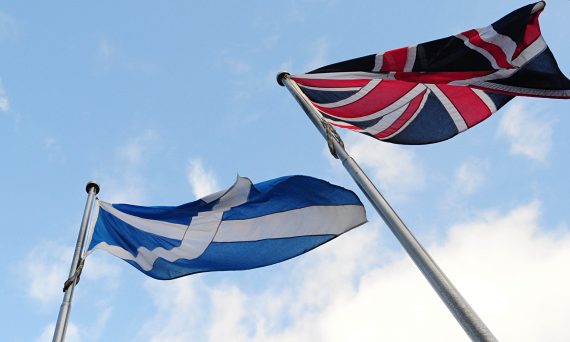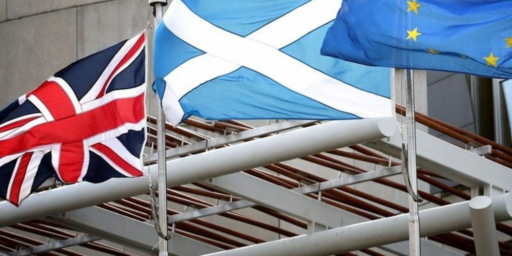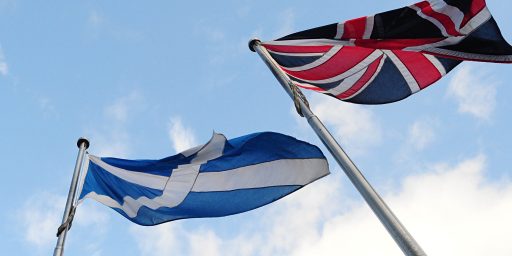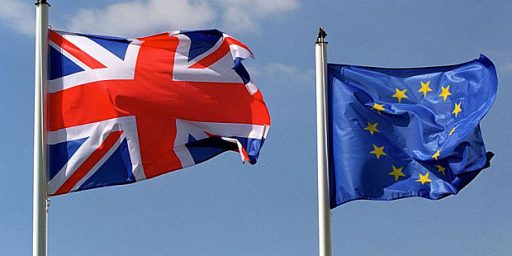Scotland May Try For Another Independence Vote
Scottish First Minister Nicola Sturgeon is hinting she might try to revive a Scottish independence vote in the wake of Brexit. That's easier said than done.

Scottish First Minister Nicola Sturgeon is saying that Scotland will consider another independence vote after the process of the United Kingdom leaving the European Union becomes clearer:
Nicola Sturgeon will consider another vote on independence when Westminster offers greater certainty on Brexit, Scotland’s first minister said Sunday.
“Once we get some clarity, which hopefully we will in autumn of this year, about the Brexit outcome and the future relationship between the U.K and the EU, then I will consider again the question of the timing of an independence referendum,” she said on ITV ‘s Peston on Sunday program.
Sturgeon also said her Scottish National Party would not block a vote on any Brexit final deal, but worried about what would happen if the different parts of the U.K voted for different outcomes in the same way they did in 2016.
More from The Independent:
Nicola Sturgeon, the Scottish First minister, has said she will “restart” the debate on Scottish independence debate in the coming weeks.
The comments from the SNP leader came as her party prepares to publish its economic growth commission, presenting its findings on economic policy options for an independent Scotland.
She said the commission, chaired by the former SNP MSP Andrew Wilson, set up in 2016, would offer the opportunity for a debate on Scotland’s future based on “ambition and hope”.
Ms Sturgeon added that she would consider the timing of a second vote on independence in autumn when the UK has some “clarity” about the Brexit outcome and the future UK-EU relationship.
In the aftermath of the EU referendum in 2016 after Scotland voted to Remain inside the bloc, the SNP leader had said a second independence referendum was “highly likely”. In 2017 she then called for a fresh vote.
But her demands were dramatically scaled back in the wake of last year’s snap general election after her party suffered a string of defeats and lost 21 seats from the 56 they won at the 2015 election.
Asked about the timing of a second independence referendum on ITV’s Peston on Sunday, Ms Sturgeon said: “Once we get some clarity, which hopefully we will in the autumn of this year, about the Brexit outcome and the future relationship between the UK and the EU then I will consider again this question of the timing of an independence referendum.
She continued: “I’m not going to say more about that in advance of that moment arising.
“But of course over the next couple of weeks we will, I suppose, restart a debate about why independence for Scotland is an opportunity and what those opportunities are.”
Referring to the publication of the commission’s report, she added: “I think that’s quite an important moment, because if you think about the last couple of years in the UK it has been very much a debate about how we cope with the damage of Brexit.
“What I think Scotland now has the opportunity to do is look at how we seize the opportunities that lie ahead, so a debate based very much on ambition and hope not a debate that’s based on despair, which is how the Brexit debate so often feels.”
Ruth Davidson, the Scottish Conservative leader, however, said the report demonstrated the union “remains under threat”.
Writing in the Financial Times, she claimed that it was “unlikely” that the latest drive would be met with enthusiasm, but warned against “complacency” and “indifference”.
“As long as our future relationship with the EU is in flux, it would be foolish to assume that the current trends on Scotland remaining in the UK will hold and that the threat of separation has gone away,” Ms Davidson said. “The SNP is in power north of the border and will use that clout to drive a wedge between Scotland and the rest of the country.
“So we unionists must work hard to bolster our case for the union.”
Sturgeon’s comments are, of course, largely rooted in the outcome of the Brexit vote nearly two years ago. While the United Kingdom as a whole voted narrowly in favor of leaving the European Union, there rather stark depart in support for the idea among the various constituent parts of the nation. England, the largest part of the U.K., voted in favor of ‘Leave” by a majority of some 2,000,000 votes and Wales voted in favor of ‘Leave” by roughly 120,000 votes. Scottish voters, by contrast, voted in favor of remaining in the E.U. by more than 600,000 votes, representing a twenty percentage point difference between ‘Remain’ and ‘Leave.’ Similarly, Northern Ireland voted in favor of ‘Remain’ by more than 100,000 votes, representing a more than eleven percentage point difference between the two options.(Source)
In the aftermath of the Brexit vote, Sturgeon hinted that the outcome of the referendum and the United Kingdom’s withdrawal from the European Union could lead her to call for a new independence referendum. This was consistent with what Sturgeon and others in her party had been saying in advance of the vote, and was largely rooted in the fact that skepticism about the advantages of membership in the E.U. never had the kind of support that it did in England and Wales. In the intervening time, though, she and her party have largely backed away from such talk as the Brexit process has moved forward. In part, that’s because the path of the Brexit process itself still isn’t entirely clear even though it’s technically on a timetable that would require formal withdrawal by some time in 2019. This softer tone was also due to the fact that Sturgeon’s party did suffer setbacks in last year’s snap election, although that was to be anticipated after the massive victories it had amassed in the 2015 General Election, largely at the expense of Labour. After it became clear that the government in London under Theresa May was committed to a “hard Brexit” that includes leaving the single market that existed prior to the E.U. itself, though, it appears that Sturgeon began to resurrect the idea of another independence vote, and she appears to be doing so again.
Notwithstanding this rhetoric, it’s far from clear that there would actually ever be a second Scottish independence vote, and the process of how to get there is far from clear. First of all, any such vote would have to be authorized by Parliament in London, and Prime Minister May has taken the same position that David Cameron did both before and after the Brexit vote that the issue of Scottish independence was closed with the outcome of the last referendum in 2014. Any second referendum would have to be approved by Parliament in order for it to have any legal force and effect and seems clear that such consent will not be forthcoming as long as the Conservatives remain in power, which will be the case until 2022 at the latest which is when the next General Election must take place unless there is another election called before then. Additionally, the official position of the Labour Party also opposes another Scottish independence vote, making it even less likely that Parliament would make any moves to authorize a second vote or that it would be approved if they did.
Even if there was a second independence referendum in Scotland, there’s no guarantee that the outcome would be any different than the outcome in September 2014. Last year, polls of Scottish voters showed that the idea of remaining in the United Kingdom was supported by a somewhat larger percentage than had voted in favor of remaining in the U.K. four years ago notwithstanding the fact that staying in the United Kingdom means leaving the European Union at some point in the next twelve to eighteen months. While that may not be the case once Brexit becomes reality, that’s not something we can predict at this point. For now, though, it seems likely that another Scottish independence vote would lead to the same outcome we saw when Sturgeon and her party tried that tactic the last time.
Finally, as was the case in 2014 when Scotland’s future hung in the balance. there is no guarantee that the European Union would accept Scottish membership, at least not initially. If it did become independent of the rest of the United Kingdom, Scotland would quickly become a much poorer nation with a smaller tax base and a large welfare state that it could no longer depend on the rest of Great Britain to help pay for. This would place it among the poorer of the members of the E.U. and could arguably constitute the kind of risk for E.U. membership that other members would rather avoid at this time, especially with the other crises occupying the E.U.’s attention. Without E.U. membership, Scotland would quickly find itself in quite the bind and quickly forced to make a choice between continuing its welfare state and adjusting to life on its own in a sustainable fashion. Sturgeon is no doubt aware of all of this, and aware of the risk she’s taking in backing independence at this rather precarious time. More likely than not, the call for another vote is a bid to get a larger voice in the Brexit process for Scotland, but if she isn’t careful, she could end up shooting herself, and the region of the U.K. that she leads, in the foot.




Doug–if you haven’t been following the ups-and-downs of the whole Brexit farrago you may not realise how much of what we’re seeing is signalling and hints to ostensibly unrelated players. First of all, the whole is-NI-in-or-out-of-the-Customs-Union? brouhaha: Scotland is quite willing to use any advantages NI receives to clamour for Scotland receiving the same treatment. (Probably using the argument that since both Scotland and NI voted against Brexit that the two entities should be treated equivalently.)
Second, there’s the whole Henry VIII power thing and how willing Scotland is to let England rule the roost when it comes to dealing with who keeps control over the powers that the EU used to have and which are devolving back to the U.K.
Third, what does Scotland get to say on any possible tinkerings of whatever final legislation and amendments the HOC/HOL puts forth to be voted on by the other EU countries?
Fourth–there is now an increasing chance that nothing will get decided by the due date, in which case everything goes potentially haywire (airplanes stop flying, border passings slow down considerably, licenses become not accepted). What does Scotland do? Can it get away from the catastrophic jump-off-the-cliff if it looks like that is what will happen, and get rescued back into the EU? Scotland may be poorer on its own, but as a member of the EU it will be lightyears ahead of the total chaos that will most likely affect England/Wales. (Hint: a non-negligible percentage of Britain’s food is imported.)
Finally, everyone is watching with dreaded fascination the infighting going on inside the Tory party and other decisions made by the present government. (To give an idea, they’ve just sent Boris Johnson to Argentina to make noises about trade treaties–and probably to suss them out about potential WTO vetos. Given that this is Argentina, with whom the U.K. had that little war with the Falklands with–and given Boris’s abilities to say the exact wrong thing–there must be a very good reason as to why Theresa May decided it was so important to get Boris out of town at exactly this time. )